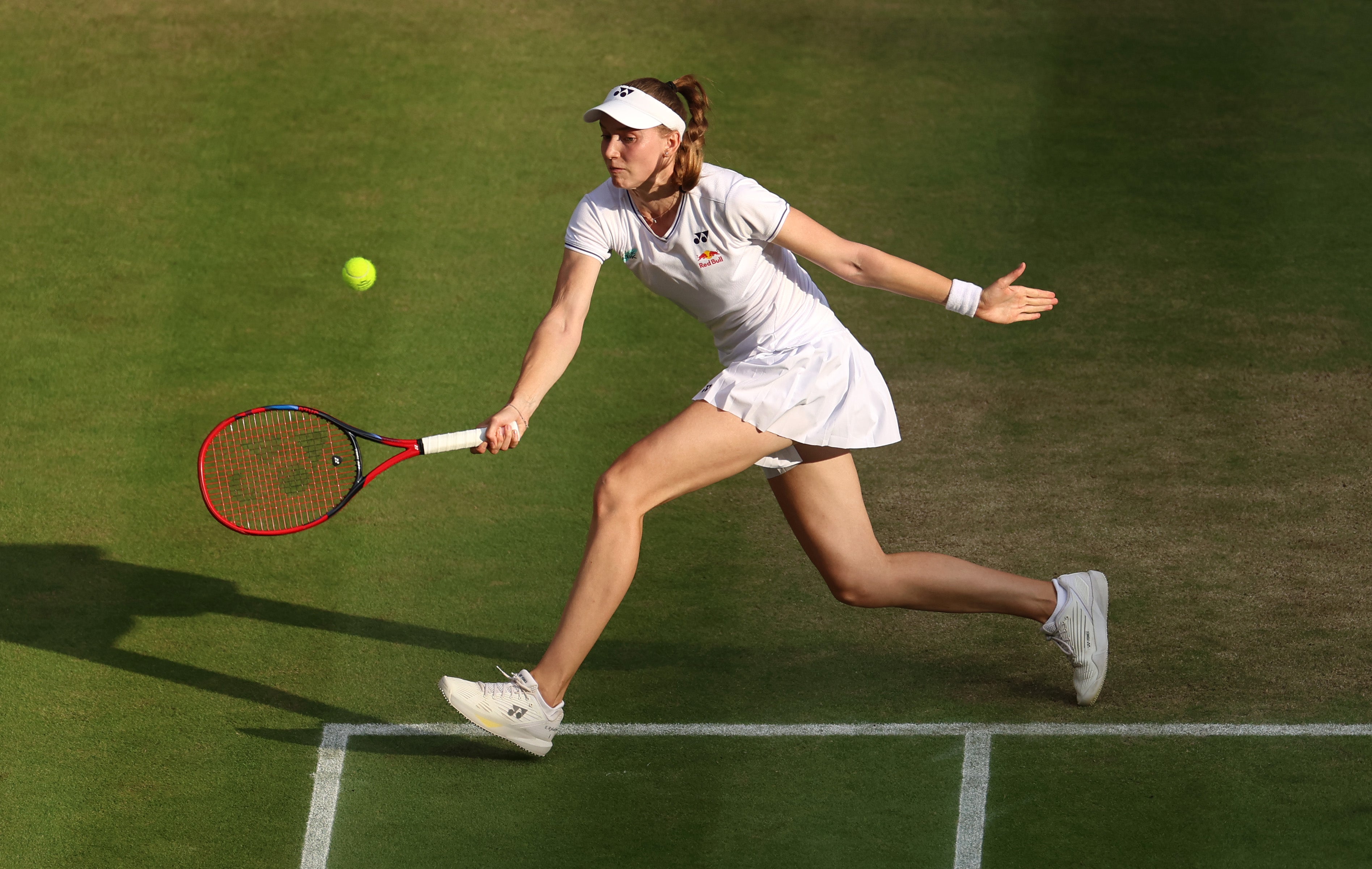For a while, this was the calm after the storm. After Jasmine Paolini and Donna Vekic ran themselves into the ground in Wimbledon’s longest-ever women’s semi-final, Elena Rybakina looked poised to navigate hers with only the occasional hint of resistance. While Paolini needed two hours and 51 minutes to fight back, reduce Vekic to tears, and position herself on the cusp of glory, Rybakina seemed likely to need about 60 minutes to extinguish Barbora Krejcikova’s dream. And after the Centre Court crowd gorged itself on the melodrama of the first semi-final, it appeared content with watching this encore politely but sleepily.
But those were assumptions, and as this match wore on, it became clear that assuming was a dangerous game.
The stands took time to fill up, as Thursday’s second semi-final ticked along, and in that sense, this was not quite the occasion that it could have been at first. Another reason for that was the manner in which the first set played out. Rybakina, the 2022 champion here, was a heavy favourite against Krejcikova, who was competing in a grand slam semi-final for the first time since her triumph at the French Open, three years ago. In fact, the Czech had never passed the fourth round at SW19 until this fortnight.
Still, Centre Court had just seen an underdog victory of sorts, as Paolini – a Duracell bunny of a player – outlasted the more powerful Vekic, so to count out Krejcikova would have been naive. And of all the crowds on all the courts, Centre’s has never been one to count out a player.
In traditional fashion, therefore, the crowd roused itself intermittently in the first set to rally behind Krejcikova, as she rallied back when she could. The fans in SW19 willed her to make more of a contest of this semi-final at 0-4 and 5-1 in the first set, and although Centre Court has offered more vigorous support in the past, Krejcikova felt it. As such, the 31st seed arrested some of Rybakina’s momentum to make it 4-1, and she went beyond that in narrowing the gap to 5-3.

Within that phase, Krejcikova even saved a set point, although it was more the result of a rare Rybakina error than anything else. Ryabkina’s forehand had been so effective in establishing her sizeable, early lead, but the Kazakh missed an easy putaway at the net at 5-2. With it, the chance to seal the set flickered out of view for the time being. That error sent gasps flitting around the stands, but Rybakina made no mistake the next time that shot presented itself: on another set point, handily.
Although Rybakina had managed to miss that shot on the previous attempt, the reality is it was one of her easier winners on a day full of them. In the first set alone, the 25-year-old racked up 19 compared to the three scored by Krejcikova. Most of those winners came on the forehand, many of them aimed up the line. One of them sealed her second straight break, while it was a pair of backhand winners up the line that moved her to 5-1 after Krejcikova’s first spurt of resistance.
Krejcikova then showed more resolve to break serve again, before Rybakina’s two failed set points, but that resolve could only carry her so far in the first set. Ultimately, Rybakina broke serve for a 6-3 success.
Still, the match could have easily have run away from Krejcikova after that, but the Czech saved break point in the opening game of the second set, giving herself a chance. She presented Rybakina a chance of her own at 2-2, slinging a ground shot into the tramlines to offer up break point, but the former world No 2 saved it and held serve with a series of slick strokes from the baseline.

And as Krejcikova began to find her range, Rybakina began to lose hers. In the stands, meanwhile, the crowd found their voice.
They grew into the match, much like Krejcikova herself, with the 28-year-old suddenly breaking as if out of nowhere. The fans then provided their loudest offering when Krejcikova reached the net against the odds and flicked a winner up the line. That shot kept her on track for a hold and a 5-2 lead, and when Rybakina held, it was back to Krejcikova to serve out the set.
Yet the match had been somewhat strange and stilted, with unusual shifts of momentum and frequent lacks of it, and that was embodied by the next game. Krejcikova led 40-0 on her serve, only to lose five set points in the ensuing exchanges, having surrendered two with double-faults.
Eventually, though, the Czech converted, forcing a decider. And while the final set was no more fluid than the two that had preceded it, it was no less absorbing either.

Midway through that deciding set, Rybakina’s stats read 33 winners and 33 unforced errors; Krejcikova had hit 20 winners and 24 unforced errors. Where Rybakina had started so mechanically, she was spluttering towards the finish line, leaking oil. But for Krejcikova, too, inconsistency prevailed. After she broke serve at a crucial juncture, she then found herself 0-30 down.
She would hold, however, and by this time, the unpredictable nature of the match had come almost predictable.
In fact, perhaps the biggest twist was that there were no more twists. Across the next two games, both players held serve, as Krejcikova booked her spot in the final.
For the eighth year in a row, there will be a different ladies’ champion, after both semi-finals went to three sets for the first time in 20 years. Does the latter quirk guarantee an epic on Saturday? It might, but these semi-finals provided no guarantees at all. Instead, they brought plenty of surprises, and if you allow yourself to expect anything on Saturday, expect more of them.

